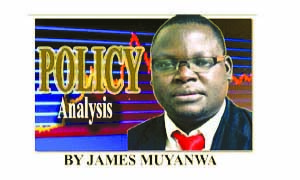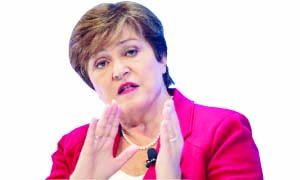EVIDENTLY, the Ministry of Finance has, particularly under current minister, Situmbeko Musokotwane, been resisting addressing any issue with a political tone, and rightly so.
Even under heavy political provocation from, for instance, some Members of Parliament (MPs) while in Parliament, Dr Musokotwane resists the temptation of jumping on their politicking bandwagon or is it boat.
This is not because the ministry and current ministry staff have no incriminating information about some of the rot which went on during the previous administration involving some leaders including some of the now vocal MPs.
I, however, noted that in the last communication from the ministry at the weekend, on the expected International Monetary Fund (IMF) bailout there was a subtle but stinging statement.
In its Sunday brief on the debt restructuring process and the IMF supported programme, the ministry asserts that the ‘New Dawn’ Government reached a Staff Level Agreement (SLA) with the fund barely three months after assuming office.
“This was on the backdrop of futile efforts previously pursued for more than five years,” partly reads the statement.
By who, everyone knows!
That was a highly-loaded but correct statement because indeed, the IMF bailout package has eluded Zambia for many years now.
This forum has featured various articles indicating that the issue of the proposed IMF financial bailout to Zambia has been with us for some time now.
The Patriotic Front (PF) government administration, particularly under former President Edgar Lungu, vainly jostled for the programme up to the time of its exit.
It must, therefore, be testing to the current government administration to hear some insinuations, mainly from past leaders, that Zambia does not need an IMF programme.
The country is well past that stage of the debate on ‘do-we-or-do-we not-need-the-IMF question!
Government officials, past and present, economic experts and others have on many occasions explained why the country needs the IMF programme.
In its little way, this forum has been at hand to feature those views on that settled matter.
This forum has been insisting that Zambia needs the support of the fund.
My opinion on that was buttressed by my observation while covering the IMF/World Bank annual general meetings in Washington DC, in 2017, and by the information from reputed local think tanks like the Zambia Institute for Policy Analysis and Research (ZIPAR).
This is to the effect that any support from the IMF will be tantamount to endorsement for Zambia’s economy and that would augment the international business community’s confidence in it.
This is notwithstanding the fact that the US$1.4 billion that Zambia is eligible to access from IMF based on the country’s own economic history, will go a long way in supporting the national budget, when it comes.
Similarly, the increased debt servicing level is always a minus to other elements within the social sector and not to mention the crowding effect borrowing creates on the private sector which has been getting less and less funds from the financing arrangement.
This is because the government and the private entities fish from the same fishponds.
Interestingly, the efforts aimed at safeguarding the future economic prospects are holistic and do not just look at the need to get some financial package.
It involves tackling real issues like the total debt stock and this is cardinal especially considering that the country defaulted on the major payment in 2020.
It is partly that defaulting that has augmented the dent on Zambia’s economic status and the current administration seems to be on course in resolving it in a civilised but less painful way.
As the ministry of finance rightly stated, the Government had anticipated that the IMF Supported Programme would be agreed on by this month-end.
There are, however, some finalisation steps, mainly related to the debt restructuring process, that still need to be undertaken before the IMF management and board consider and approve the programme.
What is noticeably reassuring is that, so far, Zambia seems to have the support and endorsement of the IMF and other critical international organisations on the matter.
Sentiments from IMF managing director Kristalina Georgieva and just last week from IMF deputy managing director Antoinette Sayeh as well as from the World Bank, are heartwarming to all those looking forward to the fund’s support.
It seems the only thing now standing between the country and the IMF support is the decision of the Official Creditor Committee (OCC) under the G20 Common Framework for Debt Treatment.
This is because, as the ministry indicates, the consideration of Zambia’s application for an Extended Credit Facility by the IMF board and the country’s debt restructuring process, are interrelated.
Getting the IMF board approval is centred on getting financing assurances from the OCC.
Admittedly, the OCC’s pace of progress is not entirely dependent on or determined by the efforts of the Zambian authorities.
The ministry states that so far the whole process has been systematic and entailed substantial traction as the government moves towards attainment of credible assurances.
Within the 10 months it has been in power, the current administration has achieved what the previous government failed to do in more than five years in terms of moving towards the acquisition of the IMF programme.
Looking at some of the prerequisites of attaining the programme, the current administration has handled the finalisation of the Debt Sustainability Analysis (DSA) with the IMF and the World Bank.
The previous administration many times hit a snag on that!
Further, the government has received pledges by multilateral lenders to provide concessional financing to Zambia as part of the effort to resolve the country’s financing limitations based on the DSA results.
The third requirement is the convening of the OCC to discuss Zambia’s request for debt relief under the G20 Common Framework for Debt Treatment, which commenced last week.
Immediately after that, the government needs to convene a committee of commercial lenders on the matter and this meeting awaits the completion of discussions by the OCC.
For comments call: 0955 431442, 0977 246099, 0964 742506 or e-mail:
jmuyanwa@gmail.com.








